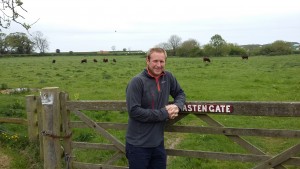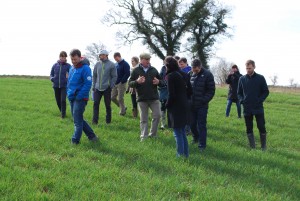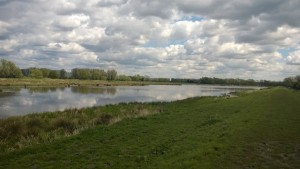We know that different groups and organisations have to work together to improve the water environment – no single organisation can do it alone. Through WaterLIFE, we’re working with government, businesses and communities to make an impact on the ground and influence the rules and regulations that govern the water environment.
In East Anglia, we’re working with farmers to implement water sensitive farming and reduce the pollution affecting two catchments’ unique chalk streams. We spoke to Ed Bramham-Jones, who is Farm Adviser at Norfolk Rivers Trust, to find out just what this entails.
About Ed
Born and bred in Norfolk, Ed has a keen interest in conservation and loves nature – enjoying long walks and bird-watching as a child. After studying Countryside Management, Ed worked as Reserve Manager for Pensthorpe Natural Park for over a decade before joining Norfolk Rivers Trust. This diverse role saw him getting involved in every aspect of land management – from looking after rare breed livestock to river management. Now, as Farm Adviser for NRT, he finds himself regularly on the farm – for both work and pleasure, as his father-in-law owns a pig farm!

Can you explain what you do and what a typical day looks like?
I will be providing support and advice to farmers and landowners through the Cam and Ely Ouse catchment to reduce diffuse water pollution from agricultural practices on a catchment scale. As part of the partnership, we will be focusing on the River Wissey and Lark catchments.
A day can include anything from GIS mapping to work out where risk areas and issues are appearing, to being out on farms giving practical advice, to engaging with stakeholders within the partnership. The project will see the implementation of silt traps, ponds and restoration and creation of wetlands to reduce silt and dirty water entering watercourses.

What is water sensitive farming?
This is all about promoting water stewardship on farms by making sure water is used efficiently and works with the environment to be able to sustain and improve ecosystems whilst still being able to farm productively. This can include improving the efficiency of irrigation, protecting water courses with buffer strips and tree planting, planting cover crops, creating silt traps and slowing the flow of water running off fields into rivers.

Why do you think there is a growing interest in water sensitive farming from different players, like the private sector?
With a growing understanding of the importance of water quality and availability to the environment as well as industry and the private sector, it is essential to improve pollution issues at source. It makes sense for farmers to keep all their soils in optimum conditions to improve yields and help water retention.
Are there any myths you regularly have to bust?
The myth that you can’t have a sustainable farming system which helps the environment – we feel that these are linked. We’re working towards creating a healthy farmed environment for water, wildlife and the landscape.
What do you see as the major challenges over the next few years?
Getting chalk streams and watercourses to Good Ecological Status is very challenging but with the WaterLIFE approach of engaging with farmers, local catchment groups and implementing improvements to farming practices it will make a significant improvement to these important habitats.
What do you love most about your job?
Getting out and meeting farmers in some of the most beautiful areas of the countryside and being able to improve water quality and soil which will benefit the wider catchments.

